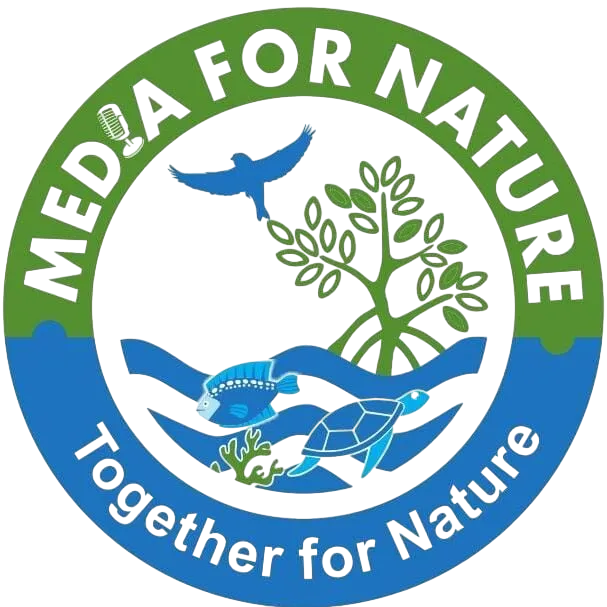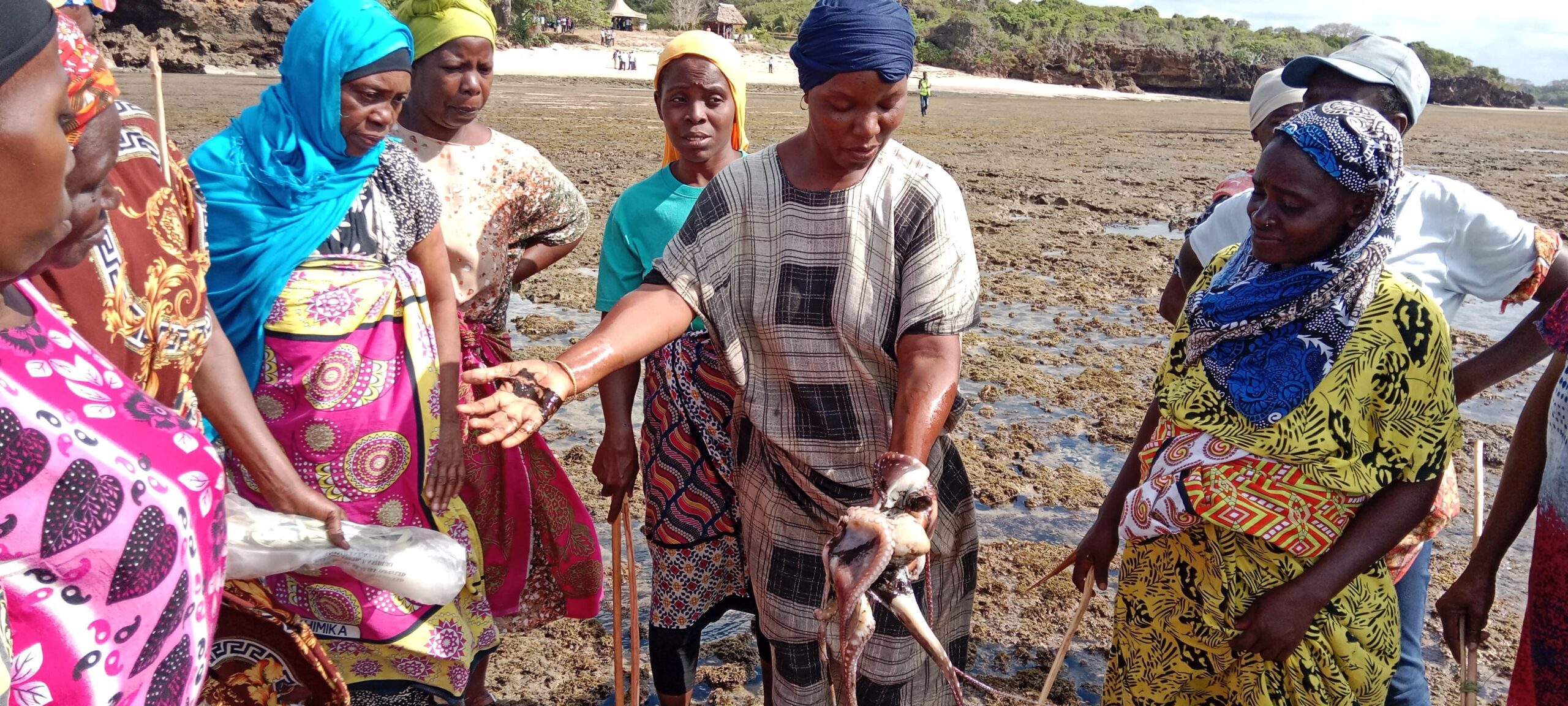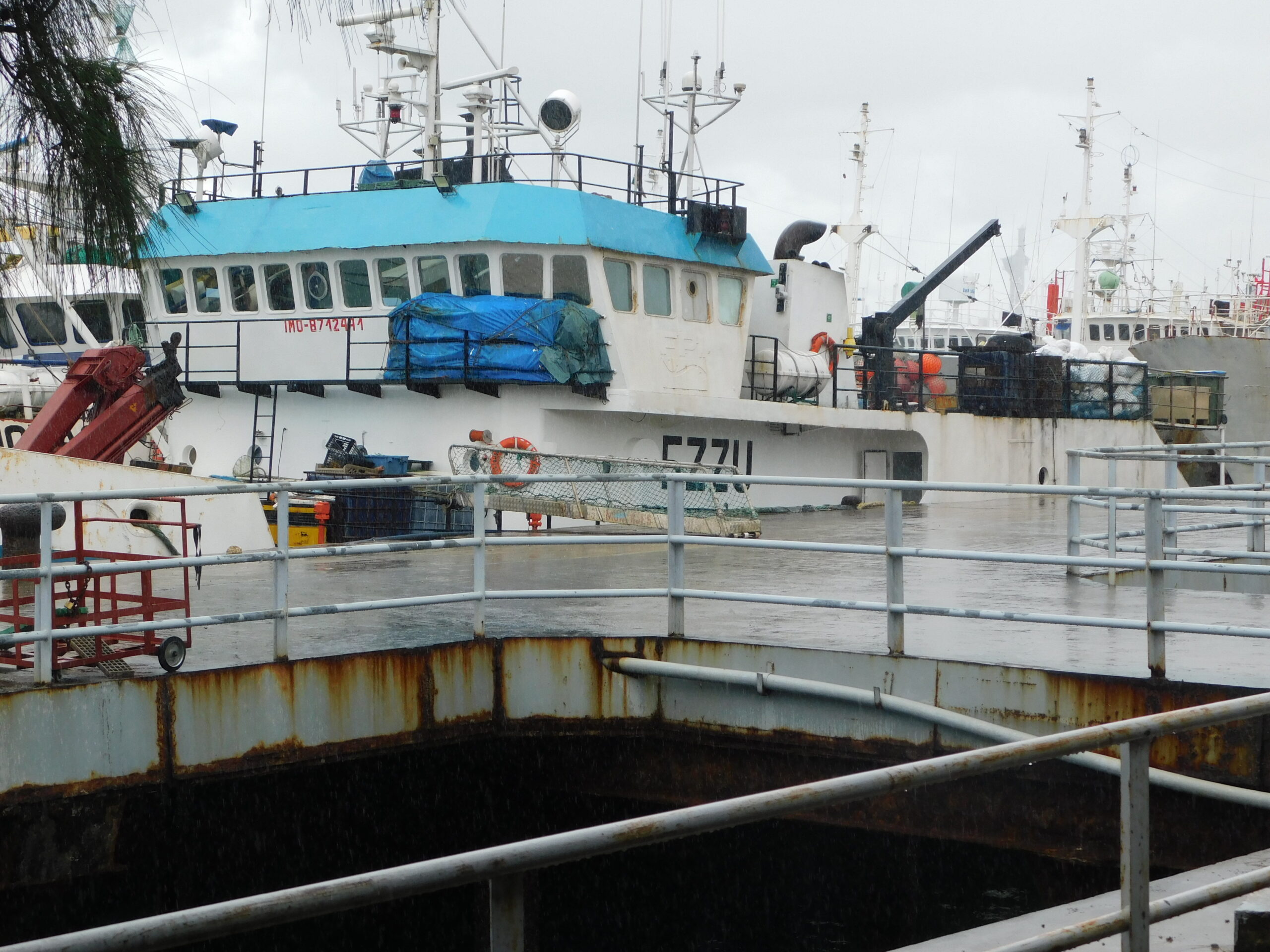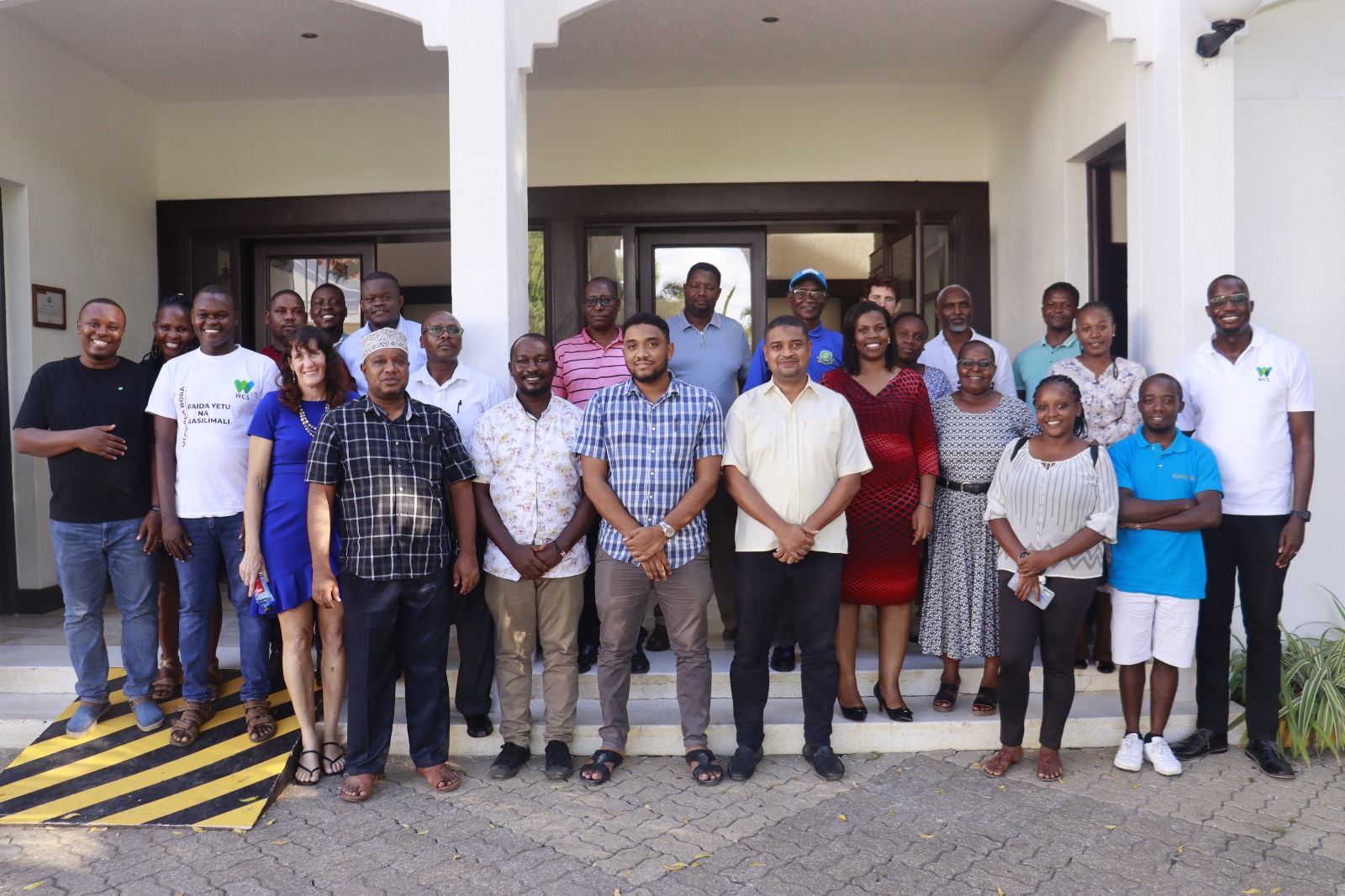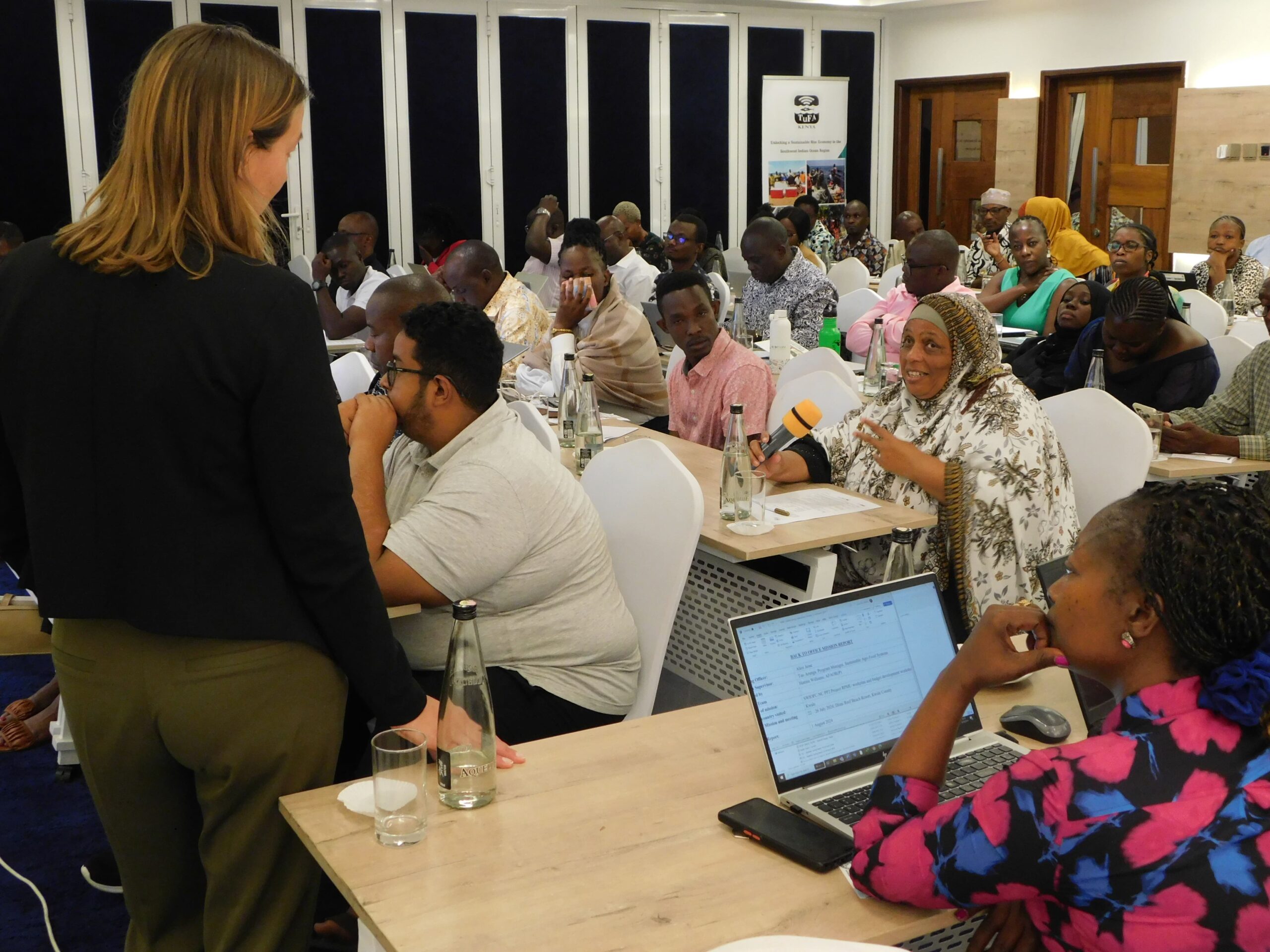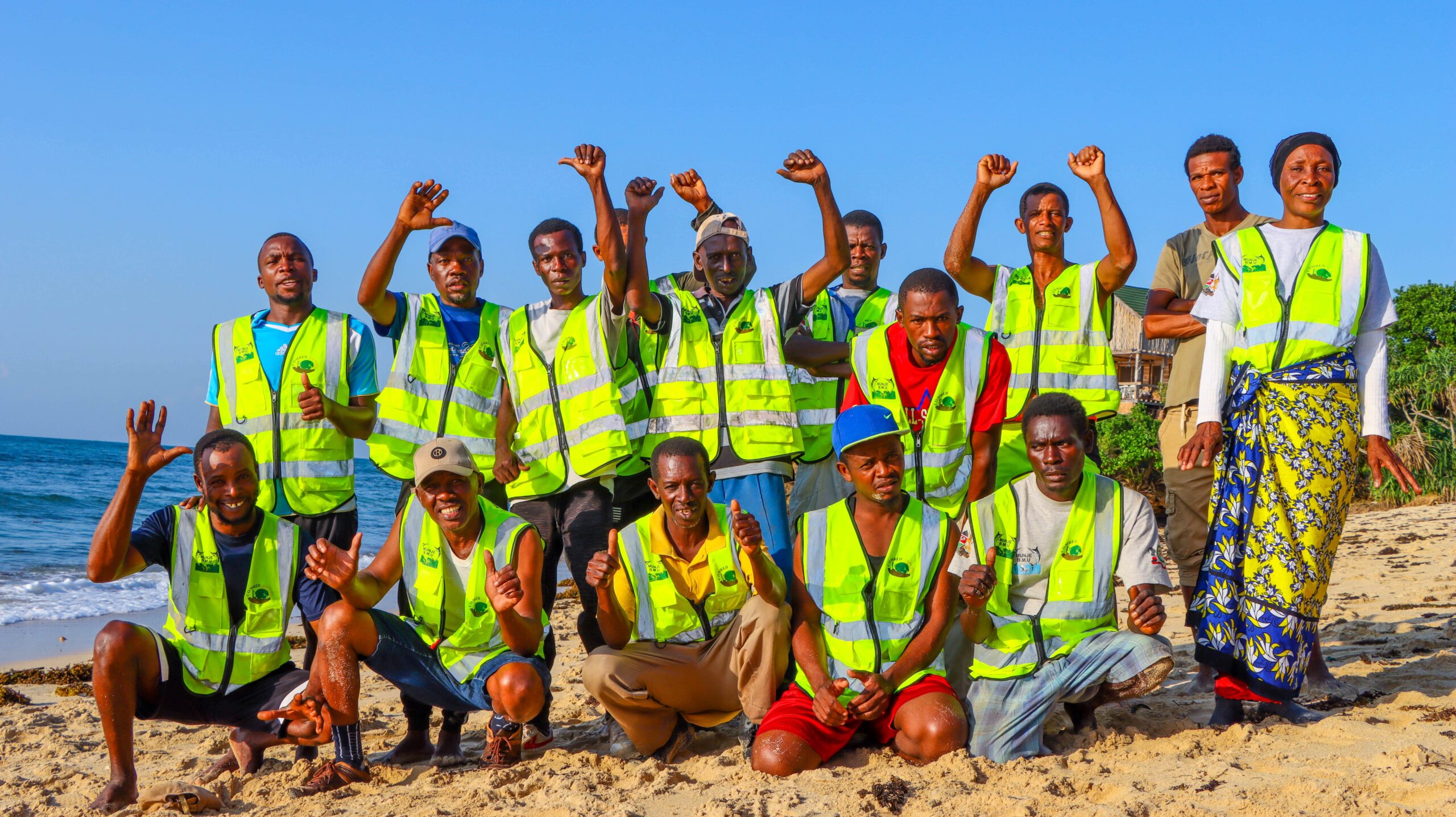Mzungu Athman, Octopus gleaner from Mkwiro demonstrating to Munje women how to handle an octopus after harvesting it from the water. This was during the opening of Munje Octopus closure: Photo: Mazera Ndurya
Her age notwithstanding, Mzungu Athman Ali has spent a better part of her life as an octopus gleaner. From the time she was a child, Mzungu would accompany her grandmother to collect octopus (it’s called ‘kuchokoza pweza’ in local parlance), a skill she has maintained for over 18 years as a source of income in Bogoa, Mkwiro within the Shimoni-Vanga Seascape in Kwale County, in Kenya’s South coast.
“Back then, there was a lot of catch and in fact very big octopuses and despite the prices being low compared to today, it was compensated by the many kilogrammes that we would accumulate from the catch.
“We didn’t have to go very far to look for octopus then but over the years, the situation has changed and it’s no longer as lucrative as it used to be,” she narrated.
The challenges that the local octopus gleaners have faced leading to poor catch are mainly related to climate change and illegal fishing through the use of harmful fishing gear.
In the past, they said, one would just be trying her luck but there was a high likelihood of getting something but it’s no longer the same currently due to climate change as well as sedimentation that have covered the octopus habitats.
Like all the residents of Mkwiro, especially the fishing community, Mzungu is excited about the recently closed Mkwiro Octopus Closure expressing optimism of a bright future saying closing the area for all fishing activities for a period of four months is an investment that promises good returns.
“We expect bumper catch when the closure is reopened for octopus gleaning compared to the current situation and I am appealing to fellow women to join us, learn the skill to benefit from this trade,” she said.

The Octopus closure in Mkwiro: Photo: Mazera Ndurya
The Mkwiro Bogoa Octopus Closure is 18 hectares and has a total of 46 octopus gleaners 40 of whom are women and six are men. The project has been funded by Blue Ventures and is being implemented by REEFolution Trust as a lead partner through Mkwiro Beach Management Unit (BMU).
The BMU has a total of 309 members out of whom 185 are women.
The Chairperson of Mkwiro BMU, Mtengo Omari Makame, has been at the centre of empowering the community economically through sustainable use of marine resources by adapting alternative sources of livelihood.
“It is also important to empower women and youths through active involvement in marine activities. As BMU, we are supposed to come up with strategies to ensure that we protect the ocean and also come up with measures on fisheries management that will prevent illegal fishing through sustainable fisheries in our community.
“We therefore saw the need to have an octopus closure so that the women whose main occupation is gleaning can be involved in sustainable fishing while at the same time grow the household economies,” he said adding that such an initiative will also benefit the fishermen who at times go to the sea and come back with little or no catch at all.
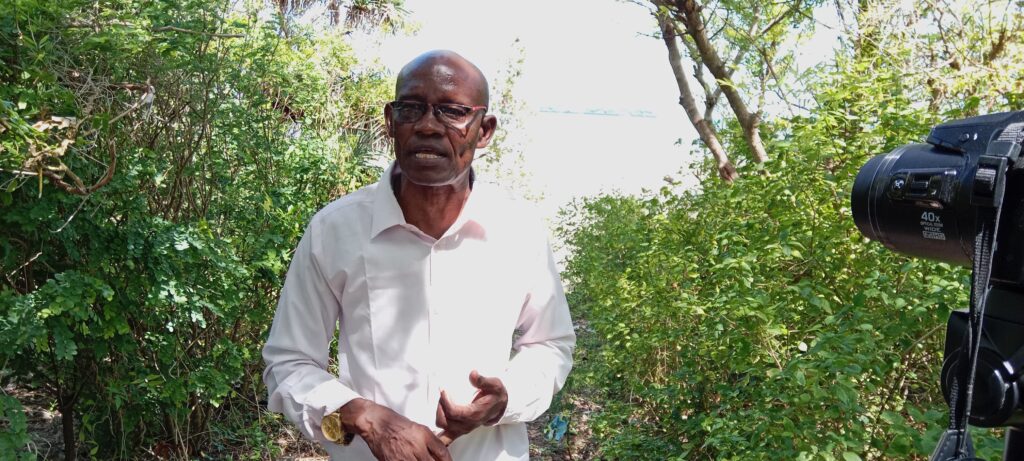
Mkwiro BMU Chairperson Mtengo Omar Makame. Photo: Mazera Ndurya.
He said the event was a culmination of continuous sensitization of the communities and other stakeholders.
The exercise leading to the closure, said Makame, involved the demarcation of the area that will have multiple advantages, including that of being a breeding area for other fish species.
“This will lead to fish spill-over to the regular fishing zones hence increase the catch to our fishermen.”
Makame said creating an octopus closure for women is not strange and involving women in fisheries is not something new noting that according to the Fisheries Act and BMU regulations, they are supposed to empower women.
“Involving women in fisheries is not a new thing because traditionally women have been the ones involved in octopus gleaning. This is a good thing to enable women benefit more.
“Women have been complaining about poor catch as a result of harmful fishing practices, therefore with the closure, the degraded areas will be restored, their catch will be enhanced and the men will have the burden of fending for their families lessened as women too will be making their small contribution,” said Makame.
Mkwiro BMU has been at the forefront in marine conservation and that’s why as it launched an octopus closure in Bogoa, another closure is helping restore degraded marine ecosystem on the other side of the island.
“We closed the area facing Shimoni some time back, to save the area that had been degraded through illegal fishing. For us to restore the area we came up with the idea of undertaking coral restoration with the support from REEFolution Trust.
“The BMU did not just stop at the closure, we went ahead to undertake eco-tourism activities within the area to create alternative source of livelihood. For the second closure, we know it will also be sustainable because it is the community that asked for it.”
REEFolution Trust Project Coordinator Yvonne Linda Muyia said the octopus closure that was launched on 12 August, 2024 was the brainchild of the community through the Mkwiro BMU.
“The idea was to help the people involved in fisheries especially the gleaners in this area. The committee members have had the opportunity to see success stories of octopus closures in Lamu and also in Tanga, Tanzania.
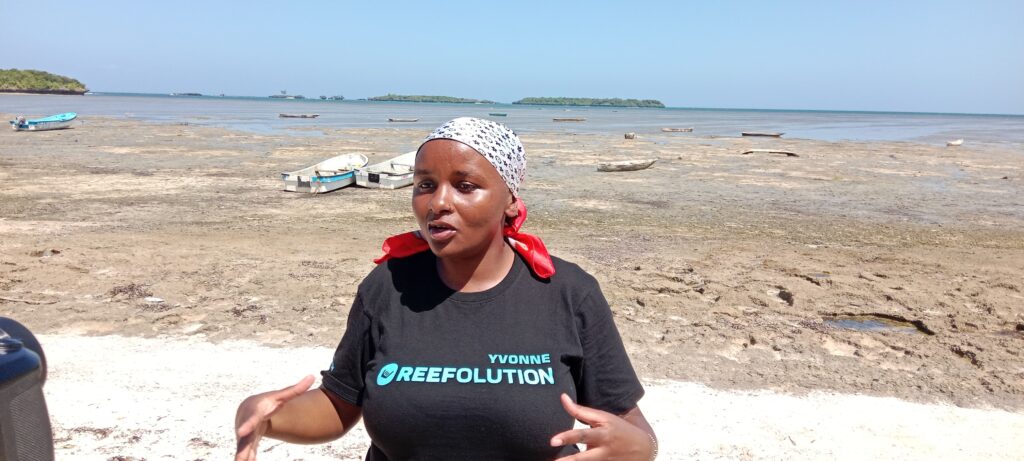
Yvonne Muyia, Reefolution Project Coordinator during the interview. Photo Courtesy REEFolution
“We started this conversation in 2022 and lucky enough in 2023, Blue Ventures came in and were willing to fund this idea and started the project in earnest after involving all the stakeholders because this is a co-management activity,” she said.
She said the area will be closed for four months, within which they will be stepping up community sensitization so that people do not go to fish because any fishing activity would have negative impact.
“The purpose of having this octopus closure is to improve the livelihood of the people. Normally, the women gleaners just meander around trying their luck and what they get are very small and often immature octopuses with minimal returns.
“If we close this area we are going to get ecological benefits because this is going to be used as a breeding area for fish. An undisturbed ecosystem means the fish from that area will be many and people will benefit from the spill over,” she said.
The main target beneficiaries are the Mkwiro woman but some men who are involved in octopus gleaning will be allowed when the closure reopens in December, 2024.
Marine scientists are saying a lot of things have happened but the fisheries sector has been hit hard by climate change and as Yvonne added, the phenomenon has increased the temperatures making corals which are the most productive in the ocean become less productive.
With the increase in population, it means the resource is already under stress while the people still want to fish.
“We can attribute everything to climate change but unsustainable fishing practices by using harmful fishing gear is also to blame. Still, climate change remains the biggest challenge and by closing this area, we hope to improve the ecology and also the octopus fishery catch in size and quantity.
“In order to ensure compliance to the regulations, we have a patrol plan where rangers will be deployed to guard the area day and night against possible poaching in the closure. During the harvest, we are also going to be strict on the type of gear used and the size and we will not allow juvenile octopus to be harvested,” she said.
The advantage that Mkwiro has is the women involvement in fisheries activities including active participation in the activities of the Beach Management Unit.
Yvonne said the project is coming to help supplement household incomes. “We want to see women getting involved. This is an intervention that doesn’t need to have women taking boats to go fishing. What we have is culturally sensitive approach that will see the women still using the traditional methods of octopus gleaning.”
Fishing along the Kenyan coast has been a preserve for men while women have been confined to being fish mongers but for Mkwiro, octopus harvesting has been associated with woman since time immemorial.
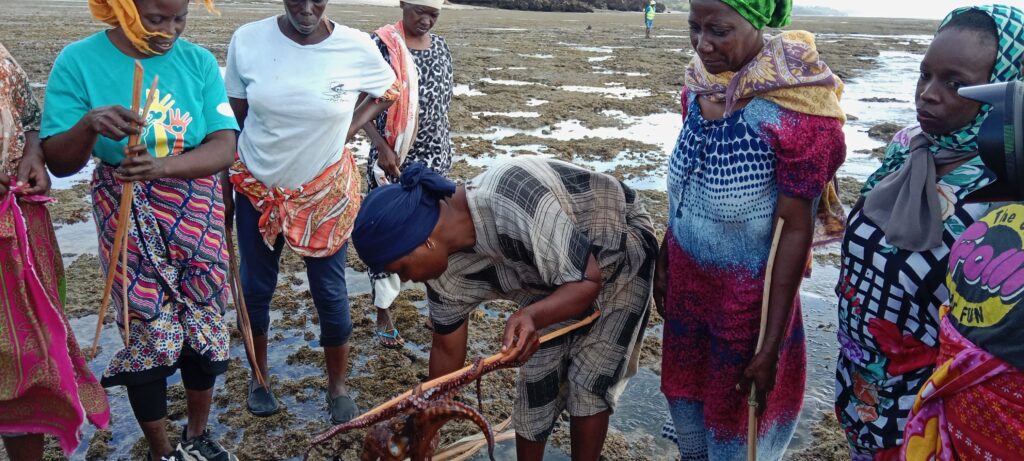
Mzungu Athman, Octopus gleaner from Mkwiro demonstrating to Munje women how to handle an octopus after harvesting it from the water. Photo: Mazera Ndurya
That is the reason Harubu Ali Msamanga, a fisherman and a resident of Mkwiro doesn’t see anything strange to dedicate an octopus closure to the women because that is their preoccupation.
Msamanga, who has been in the fishing industry for more than 25 years said the move to establish closures is noble. Apart from restoring degraded ecosystems, many creatures, fish included, need a peaceful and calm environment to thrive.
“The calmness in a closure attracts more fish and when they move for safety, the fishermen will be ready to harvest using their fish traps.
“The leaders who came up with the idea to set aside an octopus closure should be lauded because that fish species has been overfished. It may look difficult at first but ultimately the rewards will be enriching to the entire community,” Msamanga explained.
Hadijah Mohamed, a member of the Mkwiro BMU where she serves as a vice secretary couldn’t hide her joy as she joined the Makonde traditional dancers in a jig to celebrate the Bogoa octopus closure.
To her, octopus gleaning has been a lifetime preoccupation explaining that she would always accompany her grandmother from a tender age learning all the bits and pieces of the trade.
“At first we were a bit scared but with time and with the encouragement from our grandmother, it soon became part of our lives. Over 90 percent of women here depend on the ocean through octopus gleaning.
“The situation has changed drastically in terms of catch because there are more people involved and who go gleaning every day leading to overfishing,” she said.
However, she is optimistic that the octopus closure will turn things around after learning about success stories of similar initiatives in Munje, Lamu, Tanzania and Madagascar.
“My advice to fellow women is that when a project like this comes we should fully embrace it because ultimately, it’s going to help us economically and socially.”
